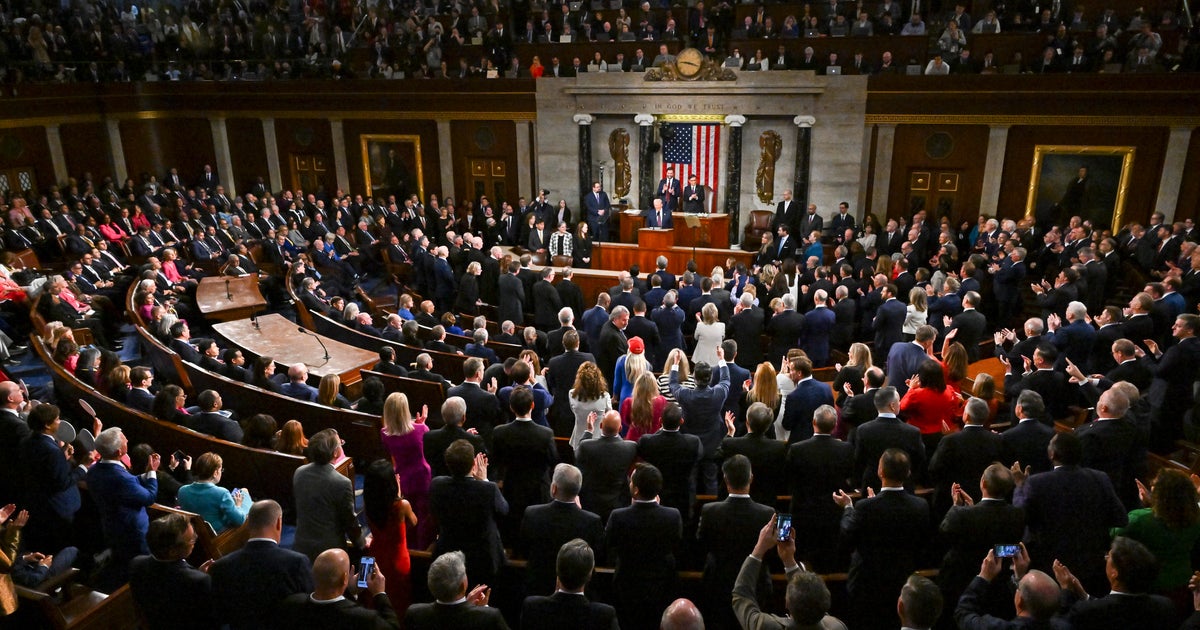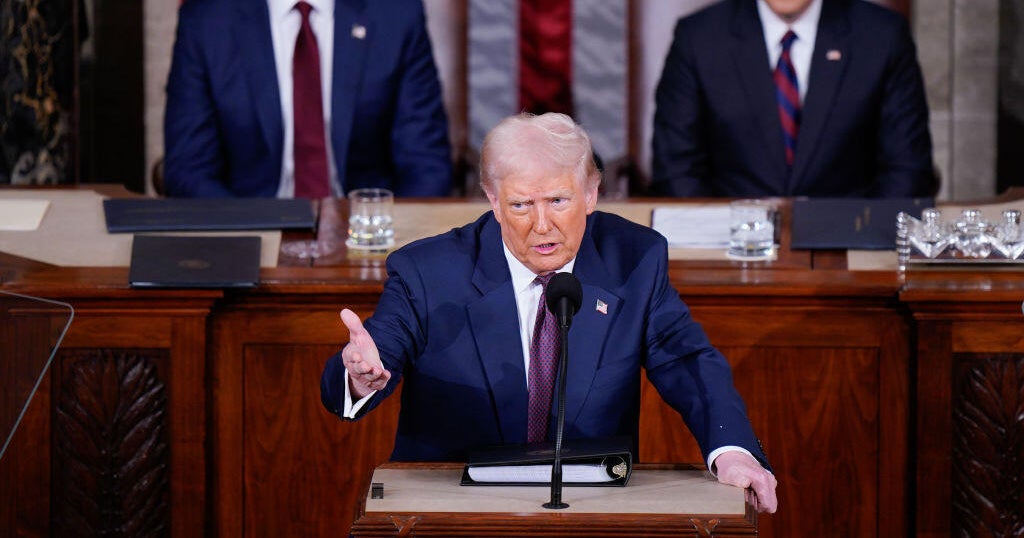Bipartisan support emerges for aid to ailing local news outlets amid pandemic
Washington — Charges of "fake news" and "enemy of the people" may still emanate from the White House, where the president continues his barrage against the Fourth Estate amidst the coronavirus pandemic.
But at the other end of Pennsylvania Avenue, there is a groundswell of support for an already battered news industry that now finds itself grappling with drastic cuts spurred by a loss in advertising revenue during the crisis. As newsrooms across the country undergo mass furloughs, layoffs and pay reductions, lawmakers on Capitol Hill from both parties are trying to ensure that news organizations large and small, local and national, have access to federal assistance.
"Just like people say, 'I hate Congress but I love my congressman,' in a similar way, politicians will say, 'I hate the media' but they also very much care about the health and well-being of their local news publisher, because they know the role it plays in the community and the need to get quality and reliable information to the public," David Chavern, president and CEO of the News Media Alliance, which represents more than 2,000 news organizations in the U.S., told CBS News.
"We've been telling the story about local news for a while, but we've certainly been in this moment saying, just when we need these folks the most, they're getting financially racked, and this is a negative impact in an industry that already had a weak financial model," he added.
A survey from the International News Media Association conducted in mid-March found that as many as 62% of news publishers experienced a decline in advertising revenue, according to the News Media Alliance. The New York Times estimates 33,000 employees of U.S. media companies have been furloughed, laid off or seen their pay reduced since the virus arrived on U.S. shores.
But Americans are turning more to local news for information about stay-at-home orders, the number of coronavirus cases in their cities and states, and where they can find testing. Comscore, which measures online traffic across the industry, found that visits to local news sites spiked 89% in March from February, while 51% of U.S. adults are following news about the coronavirus pandemic "very closely," according to a March poll from Pew Research Center.
To ensure the viability of local news outlets, a bipartisan group of four senators sent a letter to Senate Majority Leader Mitch McConnell and Minority Leader Chuck Schumer on Sunday asking them to make sure eligibility for loans under the Small Business Administration's (SBA) Paycheck Protection Program is extended to local newspapers and television and radio stations.
The senators — Democrats Maria Cantwell of Washington and Amy Klobuchar of Minnesota, and Republicans John Kennedy of Louisiana and John Boozman of Arkansas — want future legislation to waive the SBA's affiliation rules for local newspapers and broadcasters, which may restrict companies owned or controlled by larger entities from receiving aid.
"Ensuring that local news outlets remain viable at this critical time is not only a matter of fairness, but is essential to public health," the senators wrote. "Local newspapers, radio and television stations provide important local content that keeps their communities informed."
The American people, they added, look to local newspapers and broadcasters for coverage on school and business closures and to "widely community public health guidance, and to combat life-threatening misinformation."
A bipartisan group of 240 House members, meanwhile, are calling for the Trump administration to support news organizations by directing federal advertising dollars to local outlets.
"Local news and information on radio, television and newsprint is more in demand than ever, yet local media outlets are experiencing catastrophic losses in advertising revenue that allows them to continue investing in providing that news to the public," the lawmakers said in a letter to President Trump on Monday. "This national emergency has caused a near halt to local business activity and in turn, the regular and vital advertising they purchase from local media. Without advertising revenue, local media outlets cannot survive."
The White House would not comment on the record.
"We've never seen anything like this"
Jon Schleuss, president of the NewsGuild, a union that represents journalists and other media professionals, said the industry has never before experienced pain on this scale, and said it became clear roughly a month ago that the news industry was "careening toward what could be an extinction-level event."
"This is the largest news story in our lifetime, and we are losing reporting capacity when people need it most. We've never seen anything like this," he told CBS News. "It's not just the news industry. All sectors of the economy are having a really hard time right now. From our perspective, we're providing an essential service in providing information that people need to remain safe and they need to know what's going on in their communities and we also have to hold government accountable in this moment."
The prospect of news outlets turning to the government for financial assistance to keep afloat raises obvious questions about how organizations can maintain independence and objectivity. But Schleuss said the way for journalists to do so is by continuing to hold those in power accountable.
"This is a crisis and an emergency. We need to make sure that we continue to operate for ourselves but also for our communities because they depend on us so much," he said.
Some news organizations have already taken advantage of federal aid from the Paycheck Protection Program, which was implemented by Congress as part of the $2 trillion economic relief package enacted last month and designed to prevent businesses with 500 or fewer employees from laying people off.
The Seattle Times Co. revealed Wednesday it received a $9.9 million loan, which will provide the company a "lifeline" for the next 60 days, President and Chief Financial Officer Alan Fisco said in a statement. Axios, based in the Washington, D.C., area, also qualified for a loan of just under $5 million from the Paycheck Protection Program, its CEO Jim VandeHei said Wednesday.
"Along with quick moves we made early in the crisis to reduce non-personnel expenses, this loan ensures we can avoid layoffs and pay cuts for our almost 200-person staff for the rest of the year, regardless of how much the overall economy deteriorates," VandeHei wrote in Axios' morning newsletter.
The SBA announced last week it approved nearly 1.7 million applications for loans from the Paycheck Protection Program, but stopped accepting applications after the $349 billion fund was quickly depleted.
Congress, however, is working to replenish the fund. On Tuesday, the Senate approved an additional $484 billion relief package that provides $310 billion for the Paycheck Protection Program, as well as $75 billion for hospitals and $25 billion for coronavirus testing. The House is expected to vote on the measure Thursday.
House Democrats, meanwhile, have begun shifting their focus to a fifth legislative package, though it's unclear how quickly that measure will come together. McConnell told Politico in an interview the Senate should be cautious of adding to the national debt and is "not going to move on another bill related to this subject until we all get back here." Both the House and Senate are set to convene May 4.
Schleuss said the outpouring of calls from lawmakers on both sides of the aisle to ensure local news outlets get federal relief is encouraging, but warned that each day that passes without congressional action means more lost jobs and wages.
"There's so many cures to the coronavirus spreading on Facebook right now in communities that don't have any local publication," he said. "Every day there's more layoffs and furloughs and pay cuts in this industry, so every day that we don't act is going to mean that communities are going to suffer."



